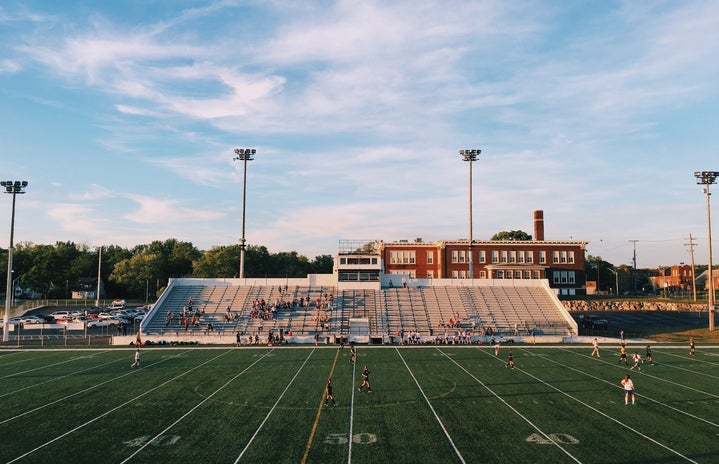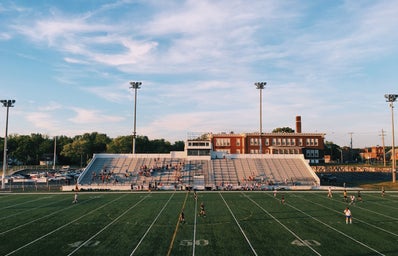#next_pages_container { width: 5px; hight: 5px; position: absolute; top: -100px; left: -100px; z-index: 2147483647 !important; }
This past January, when the NHL lockout ended to the joy and excitement of many, I found myself wondering at the seemingly ironclad attachment some people feel to a specific team or sport. Why, when the lockout ended, did some people act as though Christmas had come again, and in extreme cases, even feel a renewed sense of purpose? (Yes, I really did hear someone on the bus say in total seriousness that the ending of the lockout had given their life meaning again). Also, why do passive sports fans like me suddenly find themselves concerned with the outcome of a game when surrounded by excited fans?
I don’t really ‘follow’ sports very closely. I enjoy watching them. I don’t know all the rules, and apart from the most celebrated athletes, I don’t know the names of too many players, and I don’t know the precise moments to shout, “COME ON REF!”. Therefore, the strong, emotional attachment that a die-hard fan feels for its team isn’t something I inherently understand.
However, when I go to watch a live game or to a bar full of sports fans, I notice a shift in my interest. Suddenly, the adrenaline and excitement of everyone rooting for a team becomes infectious, and I find myself tense in anticipation for the outcome of the game. Normally neutral to the winning and losing of various sports teams, I find myself cheering when the game is going well for the team I’m suddenly hoping will win, or putting my head in my hands in disappointment when the game goes poorly. The more intense the fans are, the more energized the atmosphere feels.
There seems to be an instinctive pull, and an unconditional support that die-hard fans feel for their teams. Instead of saying, “the Sens won” they say “we won”, and “the Sens lost” becomes “we lost”. So what is behind the intense bond a die-hard fan feels for its team? And why is it so strong, that it can reach out and brings non-die-hards along for the ride?
According to the Brand Keys Sports Loyalty Index, fan loyalty is driven in four ways:
Pure Entertainment – How well a team does, but more importantly, how exciting is their play?
Authenticity – How well they play as a team. New stadia can help on this driver. Oftentimes, so can a new Manager.
Fan Bonding – Are players respected and admired?
History and Tradition – Is the game and the team part of a fan’s and a community’s rituals, institutions and beliefs?
There are a number of obvious reasons regarding how people pick the teams they cheer for. Some people grow up with a parent who cheers for a specific team and so they become fans through association. Other people grew up or live where their team comes from. This is most often the case: geography. Common geography can create a binding connection between fans and the team they cheer for. But again, why? If the Ottawa Senators, with the exact same athletes, came from a different place, would Sens-fans no longer care about Daniel Alfredsson? Furthermore, if you took two rival teams, for example the Sens and the Toronto Maple Leafs, and just switched the city that the team represents, would someone from Ottawa still cheer for the Sens, even though they now represented Toronto?
Most of the people who I directed this exact question to answered along the same line: That the attachment to a team starts with location, however, if their original team was suddenly moved to represent a different city, their attachment would remain. Meaning those born in Ottawa cheer for the Sens, but if the Sens were moved to play for Toronto, Alfie would still be their main man.
The further I dug into the relationship between a die-hard fan and their team, the more apparent it has become that for a lot of people, watching sports often comes with a feeling of being a part of ‘something bigger’.
In evolutionary terms, a strong identification with one’s social group was a necessity for survival. As writer Thomas Van Shaik aptly puts it, “Some psychologists claim that fan psychology is rooted in primitive times when we lived in small tribes, and warriors fighting to protect our tribe were true genetic representatives of ‘our people’. In today’s society athletes play a similar role for a city, club or school in the stylized war on a playing field – as the theory goes. The athlete’s exploits helps reconnect the fans with those intense emotions that tribal warfare did for their ancestors.” Another example of the necessary role communities have played can be found in Ancient Greece, where being exiled was almost thought of as worse punishment than death. Nowadays, our neighbours and the people in our immediate surroundings are no longer a direct necessity to physically ‘living’. However, the need to identify with a social group hasn’t disappeared. It has just been replaced with various substitutes such as nationalism, religion, or… sports?
Think about it, when you got to a big game, what is in your eye-line? Sure, there’s the game itself but there are also hundreds of other fans. Depending on what sport you’re watching, there’s the chance that any given spectator will get their own moment in the spotlight on the jumbotron. Even though the fan isn’t physically involved in the game, they do participate in the event itself through costumes, cheers, social rituals, etc.
Being a die-hard fan of a sports team automatically gives you a shared interest with other people. Two completely different people can go to a hockey game, and they can have different jobs, be of different ethnicities, different gender, different political affiliation, different socioeconomic statuses, etc. But if they both show up rooting for the same team, then for the length of the game they are standing on common ground and have a mutual goal, despite other differences.
What is also interesting about die-hard sports fans in general is that they emotionally invest in an outcome that they can in no way control. But that’s the point; their love of a sport is worth the gamble. At the end of a game, when they say “we won” or “we lost”, it can actually feel like a real accomplishment or a real let-down. However, these wins or losses have almost a paradoxical relationship with the fans life, because it both matters and doesn’t matter all at once. The emotional response is real, but the direct impact that the game takes on the fans life is usually minimal. In way, a game is the opportunity to feel that you have put a lot at stake, without having to worry too much about things going wrong. As Shaik says, “It’s heartbreak with training wheels”.
A quick search of ‘fan psychology’ online unleashes loads of sports fans wanting to explain their attachment to their teams:
“A nice play is just a nice play, but you don’t get the same thrill if you care about the team making it (or being victimized by it).”
“It’s a sense of emotional involvement, which is a powerful thing for us humans.”
“It’s no different than rooting for a character in a book or film or play. You get involved in the story of what is going on if the author has done his/her job correctly. And you can also just the words or pictures flow over you. Same thing applies to sports. You can appreciate it for the story that goes on during the game. You take a vested interest in one side’s success.”
“My hypothesis is that in really good times, people need something to care about, and in really bad times, something to distract them.”
“It’s a small part of pleasant history that you get to experience vicariously.”
Die-hard sports fans have the tendency to be very proud. Therefore, if any of them are reading this, there’s a good chance they’ll be quick to say, “She doesn’t get it”. And maybe I don’t. Maybe it’s a secret society that only those born into sports-loving understand. But what seems clear to me from fandom in general is that people tend to search for something, separate from themselves, to invest in. So attaching yourself to a team gives you a way to participate in a sport you love. And whether or not this article has made any kind of dent into the psyche of the die-hard sports fan, I find the origination of the word ‘fan’ (from the Modern Latin word ‘fanaticus’) sums it up nicely: “Insanely but divinely inspired.”
Photo Credits
Photo 1: http://www.flickr.com/photos/tsevis/5852482163/
Photo 2: http://www.carillonregina.com/?p=10383

